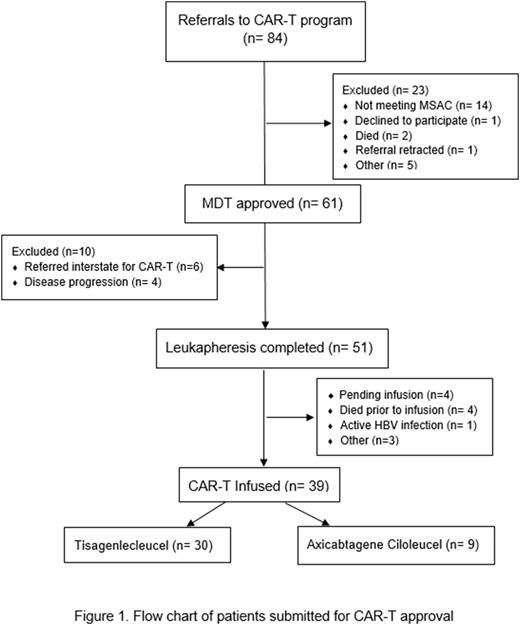Abstract
Aim: Chimeric antigen receptor T cell (CAR-T) therapies targeting CD19 have transformed treatment of relapsed/refractory large B cell lymphoma and B cell leukaemia (B-ALL). Our institution is the sole provider of CAR T-cell therapy in Queensland and northern Australia; servicing a population of approximately 6 million people over 3.8 million km2. In Australia, the commercial CAR T-cell program is only available and funded for patients who meet the nationwide guidelines that are stipulated by the Medical Services Advisory Committee (MSAC). Here we present clinical outcomes of all patients treated with commercial CAR T-cell products since the program commenced.
Method: All patients referred to the Royal Brisbane and Women's Hospital commercial CAR T-cell program between July 2020 to July 2022 were identified. Clinical and laboratory data were obtained by retrospective chart review. The primary outcome was overall response rate (ORR; defined as combined incidence of complete [CR] and partial [PR] responses) at day 30 and day 180 post infusion. Secondary outcomes included mortality and incidence of cytokine release syndrome (CRS) and immune effector cell acute neurotoxicity syndrome (ICANS).
Results: Of the 84 patients referred during the study period, 39 have received CAR-T infusion, resulting in 36 evaluable at D30 and 27 evaluable at D180 (see Figure 1). Indication for CAR T-cell therapy included B-ALL (7%) and large B cell lymphoma (93%). ORR for the entire cohort was 72% (26/36) at D30 and 41% (11/27) at D180. At D30, CR was 12 (33%) and PR 14 (39%). By D180, 6 remained in CR but another 4 PR converted to CR. CRS and ICANS occurred in 82% and 28% respectively. There were 0 episodes of grade ≥ 3 CRS, and 4 episodes of grade ≥3 ICANS. At census date, 12 (31%) patients had died due to either progressive disease (11; 28%) or severe infection (1; 3%).
Conclusion: Northern Australia's geographically dispersed regional/rural population, spanning multiple state health jurisdictions, presents unique logistical challenges to the successful implementation of a highly complex and novel cellular therapy program, particularly when commencing during the COVID-19 pandemic. Despite these potential barriers, our program's data demonstrates that CD19 CAR T-cell therapy is deliverable and produces similar outcomes to those reported in other real-world studies. These results reflect state-wide co-operation between regional haematologists and the tertiary referral centre throughout apheresis, bridging, and post-CAR-T care. Our commercial CAR T-cell program is now complemented by investigator-initiated clinical trials using locally manufactured CAR products.
Disclosures
No relevant conflicts of interest to declare.
Author notes
Asterisk with author names denotes non-ASH members.


This feature is available to Subscribers Only
Sign In or Create an Account Close Modal